“Beat the bulge” – Trisha Lewis’s trademark slogan – oozes positivity and can-do attitude. Speaking to her, a couple of things ring true; she’s a bundle of energy, upbeat and a rock of sense.
Trisha is known for the honest and realistic documentation of her weight-loss journey on her Instagram page, Trisha’s Transformation. Here she preaches long-term lifestyle changes as opposed to quick diet fixes to her almost 120,000 followers.
At a glance, such is her positivity, it could be easy to think Trisha has never had a bad day or sad moment. But in fact, she’s very open about struggling with her weight and how this brought her to some dark and difficult places in the past.
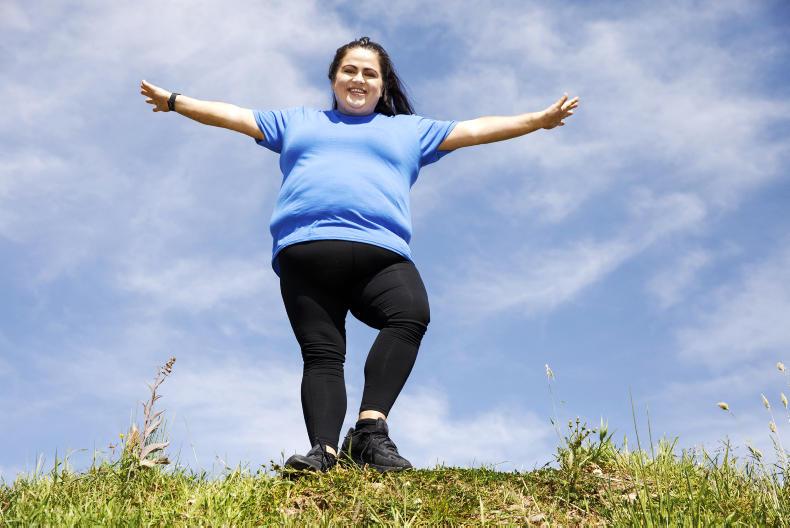
Trisha says she didn’t enjoy home workouts at the beginning of the lockdown, but she began to change her attitude towards it. \ Donal O’Leary
Her new book, Trisha’s Transformation: Beat the Bulge and Still Indulge, correlates both Trisha’s light and dark. Roughly half the book tells Trisha’s story, how she went from being seriously depressed and unhealthy, to taking ownership of her life and loving herself. Seeing as she’s the executive head chef at Jacobs on the Mall in Cork and an advocate for nutritious food, the other section is healthy recipes.
But, before Trisha could get to the highs of releasing her own book, co-hosting a podcast, Instagram fame, being on The Late Late Show and speaking at last year’s Women & Agriculture Conference, she had a lot to get through. Let’s start at the start, shall we?
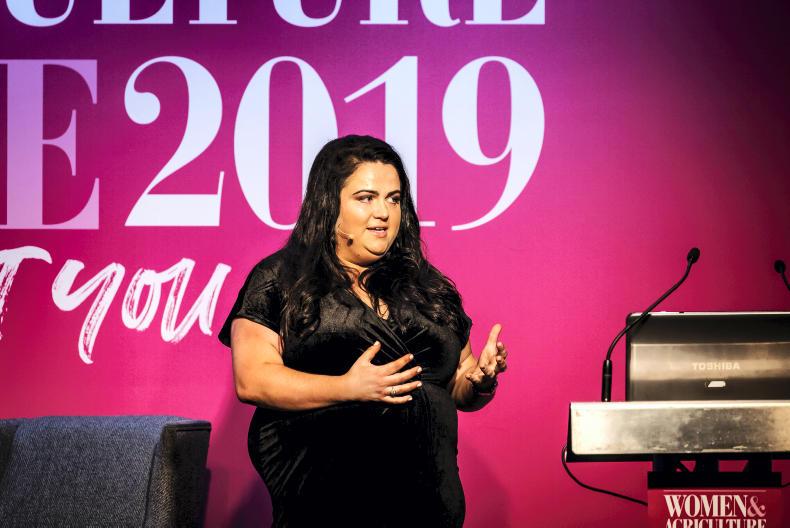
Trisha Lewis speaking at the 2019 Women & Agriculture Conference. \ Philip Doyle
Difficult days
One of nine sisters, Trisha grew up in Co Limerick, not far from Mitchelstown in Co Cork, on her family’s dairy farm. Her father and mother run the farm. When she was on The Late Late Show her father stayed at home to milk the cows so her mother could go with her (she’s a huge Ryan Tubridy fan).
From a young age, Trisha struggled with her weight and this got progressively worse as she got older. At her heaviest, Trisha was 26 stone. Although she’s now staunchly against quick fixes and promotes losing weight through healthy eating and exercise, by 2016 she had decided to travel to Belgium to get a gastric bypass.
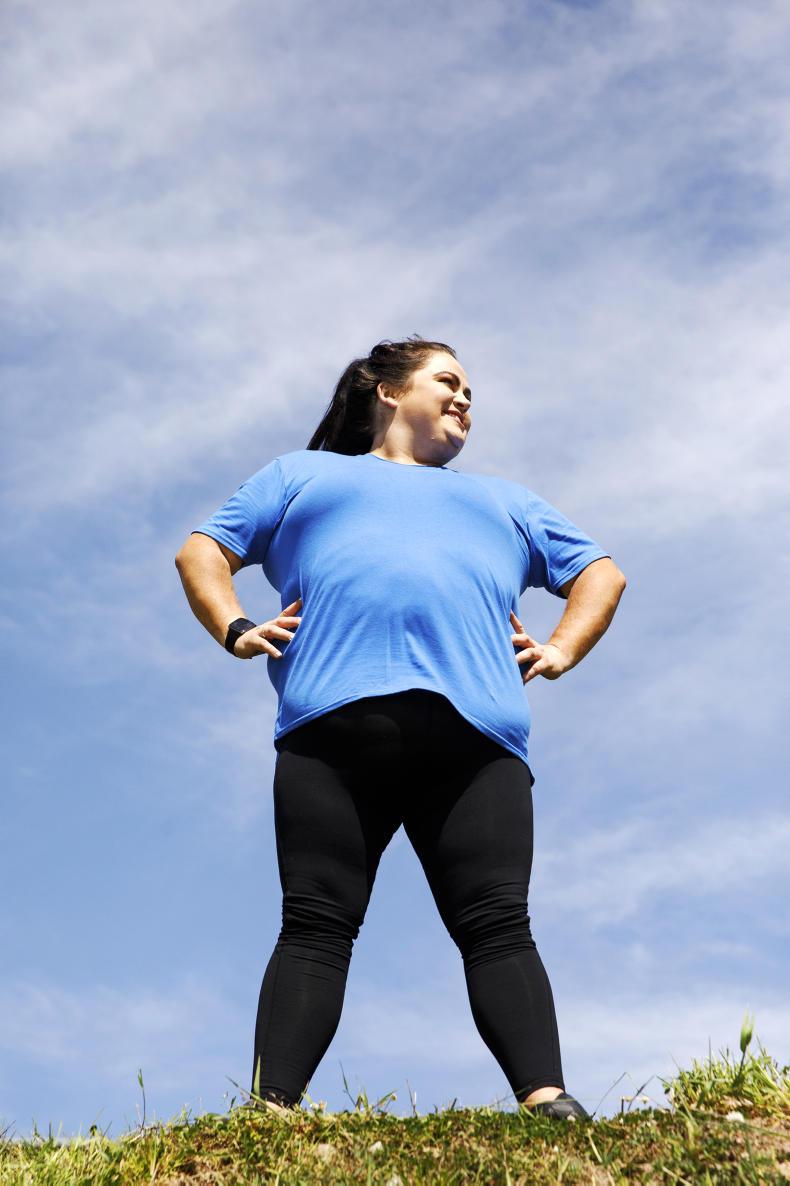
Trisha grew up on a dairy farm in Limerick, not far from Mitchelstown. \ Donal O’Leary
In the end, although she had paid a deposit, Trisha didn’t go through with the surgery. Her sisters were worried about the consequences for her health and that the weight loss would be unsustainable.
“It’s the best €4,000 I’ve lost in my life,” says Trisha reflecting on the situation. “It was just never going to be for me. I don’t think it’s the easy way out, I’m glad I picked the easier route of the gym.
“‘Quick fix’ is a phrase that comes up a lot, I actually think it’s a longer fix. I think it’s a battle forever, because a whole part of your life is gone and you can’t have your meals out, portions are limited, you can’t enjoy food the way you want to.
“It’s nowhere near as easy as the route I took, but it’s not sold like that. It’s sold as: ‘You’re going to lose 16 stone in 15 months.’ You probably are, but by God your mental battle has to catch up a lot faster.”
Although Trisha did listen to her sisters, she was angry with them and felt they had taken away her chance at happiness. While struggling with her weight, this is something Trisha often did, lash out at the ones she loves.
Looking back now, Trisha openly acknowledges she was difficult to be around. It was hard to reflect on these experiences for the book, but also very healing, she says. In the book Trisha opens up about contemplating suicide. Something she had never spoken to anyone about before.
“Ringing the Samaritans, opening up about that, it was the first time I had ever spoken about it to anyone. The first person who read it was my editor. It was hard, but I knew it was necessary.
“I knew if I was going to be the real Trisha, I wasn’t going to leave anything back. I would think of a memory and write, write, write. When I read it back then it used to make me cry. I found the book a very healing process.”
Breaking though
In the end, Trisha’s breakthrough came with the help of her sisters, who never gave up on her. 
Early in 2018, her sister Annie was pregnant and Trisha attended an emergency scan with her. This was very much a turning point.
“I was trying to console Annie at the hospital, everything was fine in the end thank God, but I remember being so uncomfortable that someone would laugh at me or ask when I was due. I kept going up and down to the shop, I was going in and out for fags.
“When the heartbeat came through the monitor, that moment was horrendous for me, because I knew this kid would hate who I was. I wasn’t a very nice person to be around at the time. I was irritable, I was uncomfortable, I was afraid I was going to die, I was afraid I was going to have a stroke. So all of this was running through my head and I left the room.
“Annie came out and I think she felt the same as me. That’s when she confronted me. She was like, ‘I can’t sleep, I can’t eat, I can’t think about bringing a new baby into the world when I’m terrified my sister is going to die’. I was bawling crying.”
Although this may have been Trisha’s lightbulb moment, people need to know, she says, that often the light only flickers on and you’ve to search again for the switch. Two weeks later, having ignored Annie, who was still trying to get through to her, she got up one morning, joined a gym and hired a personal trainer.
From here, Trisha hasn’t really looked back. She changed her diet, started exercising and ditched the cigarettes. In her honest style, she says, it’s a lie to say people will love the gym at the start. It took her two months to get into it, but after that, she started doing it not for weight loss, but for herself. This happened in tandem with her depression easing.

Trisha now has a passion for exercise. \ Donal O'Leary
“Two months in I started to love it. I showed some of the videos of me exercising to Mam and she was like, ‘Oh my God, you’re an athlete’. I remember my chest filled with pride and I was like, ‘I actually am’.
“I stopped looking at the gym as a weight-loss tool and it was more about helping my mind,” explains Trisha. “It was about something more than being overweight, I started calling myself an athlete and it actually helped so much.
“To go from being very depressed to being very happy took about two to three months of just forgiveness, happiness and positive vibes. I thought it was something I would never come out of, I really, really thought this is how I would feel forever.”
Control the controllables
Trisha has now passed the 100-pound mark in her weight loss. However, that said, a key element of her ethos is not focusing on the scales, but the journey. She says losing weight is something she will be doing for the rest of her life, so she has to make it a process she loves.
“When I started the journey, I was like, it’s going to take 10 years, and it will take 10 years. That’s the thing, it will take me the rest of my life to lose this weight. But it’s amazing how quickly you can turn something around by just doing it. When people get bogged down, they think they’re gone too far, you’re never gone too far, ever.”

Trisha Lewis working out at home. \ Donal O'Leary
Another aspect of Trisha’s Transformation mantra is self-love and being prepared for setbacks. At the start of lockdown, the day Trisha was 13 years working in Jacobs, the restaurant closed due to COVID-19 and Trisha was out of work.
Being out of her routine is something she really struggled with. She didn’t like home workouts and her diet was slipping.
“I sat down and realised that I could only control the controllables. I got a notebook and I wrote down what I could control and what I couldn’t control. I couldn’t control the pandemic, I couldn’t control the fact that I was out of work. But what I could control was my food, my sleep, my nutrition and my thoughts.
“At the time I thought it was going to be so difficult, but I focused on that every single day for two weeks and I completely came out of it.”
For Trisha, it’s important that weight gain isn’t looked upon as negative.
“Sometimes with diet culture it’s shown that weight gain is negative and if you go off the bandwagon then you did something wrong, when you actually didn’t, you just lived. That’s what I would love for people to get, stop punishing ourselves for having three bars of chocolate, there’s bigger fish to fry. All you’ve got to do is reset and start again.

Some workouts can be done with minimal equipment, like a medicine ball. \ Donal O'Leary
“That’s what I’ve found has helped me the most on this journey. I think that’s why I’ve sustained what I’ve lost, because I just move on. I don’t dwell on the past as much. If I want to have my Chinese takeaway, I’ll have it. I’m not going to moan about it afterwards.”
Going forward, there’s so much living Trisha wants to do. With her usual exuberance, she says she wouldn’t rule out book number two and she would love to get into some media or television work. But, whatever path Trisha takes, with her positive mindset and long-term life changes, she’s sure to enjoy the journey.
Read more
Women & Ag: beating the bulge
Watch: what the speakers had to say at Women & Ag
“Beat the bulge” – Trisha Lewis’s trademark slogan – oozes positivity and can-do attitude. Speaking to her, a couple of things ring true; she’s a bundle of energy, upbeat and a rock of sense.
Trisha is known for the honest and realistic documentation of her weight-loss journey on her Instagram page, Trisha’s Transformation. Here she preaches long-term lifestyle changes as opposed to quick diet fixes to her almost 120,000 followers.
At a glance, such is her positivity, it could be easy to think Trisha has never had a bad day or sad moment. But in fact, she’s very open about struggling with her weight and how this brought her to some dark and difficult places in the past.

Trisha says she didn’t enjoy home workouts at the beginning of the lockdown, but she began to change her attitude towards it. \ Donal O’Leary
Her new book, Trisha’s Transformation: Beat the Bulge and Still Indulge, correlates both Trisha’s light and dark. Roughly half the book tells Trisha’s story, how she went from being seriously depressed and unhealthy, to taking ownership of her life and loving herself. Seeing as she’s the executive head chef at Jacobs on the Mall in Cork and an advocate for nutritious food, the other section is healthy recipes.
But, before Trisha could get to the highs of releasing her own book, co-hosting a podcast, Instagram fame, being on The Late Late Show and speaking at last year’s Women & Agriculture Conference, she had a lot to get through. Let’s start at the start, shall we?

Trisha Lewis speaking at the 2019 Women & Agriculture Conference. \ Philip Doyle
Difficult days
One of nine sisters, Trisha grew up in Co Limerick, not far from Mitchelstown in Co Cork, on her family’s dairy farm. Her father and mother run the farm. When she was on The Late Late Show her father stayed at home to milk the cows so her mother could go with her (she’s a huge Ryan Tubridy fan).
From a young age, Trisha struggled with her weight and this got progressively worse as she got older. At her heaviest, Trisha was 26 stone. Although she’s now staunchly against quick fixes and promotes losing weight through healthy eating and exercise, by 2016 she had decided to travel to Belgium to get a gastric bypass.

Trisha grew up on a dairy farm in Limerick, not far from Mitchelstown. \ Donal O’Leary
In the end, although she had paid a deposit, Trisha didn’t go through with the surgery. Her sisters were worried about the consequences for her health and that the weight loss would be unsustainable.
“It’s the best €4,000 I’ve lost in my life,” says Trisha reflecting on the situation. “It was just never going to be for me. I don’t think it’s the easy way out, I’m glad I picked the easier route of the gym.
“‘Quick fix’ is a phrase that comes up a lot, I actually think it’s a longer fix. I think it’s a battle forever, because a whole part of your life is gone and you can’t have your meals out, portions are limited, you can’t enjoy food the way you want to.
“It’s nowhere near as easy as the route I took, but it’s not sold like that. It’s sold as: ‘You’re going to lose 16 stone in 15 months.’ You probably are, but by God your mental battle has to catch up a lot faster.”
Although Trisha did listen to her sisters, she was angry with them and felt they had taken away her chance at happiness. While struggling with her weight, this is something Trisha often did, lash out at the ones she loves.
Looking back now, Trisha openly acknowledges she was difficult to be around. It was hard to reflect on these experiences for the book, but also very healing, she says. In the book Trisha opens up about contemplating suicide. Something she had never spoken to anyone about before.
“Ringing the Samaritans, opening up about that, it was the first time I had ever spoken about it to anyone. The first person who read it was my editor. It was hard, but I knew it was necessary.
“I knew if I was going to be the real Trisha, I wasn’t going to leave anything back. I would think of a memory and write, write, write. When I read it back then it used to make me cry. I found the book a very healing process.”
Breaking though
In the end, Trisha’s breakthrough came with the help of her sisters, who never gave up on her. 
Early in 2018, her sister Annie was pregnant and Trisha attended an emergency scan with her. This was very much a turning point.
“I was trying to console Annie at the hospital, everything was fine in the end thank God, but I remember being so uncomfortable that someone would laugh at me or ask when I was due. I kept going up and down to the shop, I was going in and out for fags.
“When the heartbeat came through the monitor, that moment was horrendous for me, because I knew this kid would hate who I was. I wasn’t a very nice person to be around at the time. I was irritable, I was uncomfortable, I was afraid I was going to die, I was afraid I was going to have a stroke. So all of this was running through my head and I left the room.
“Annie came out and I think she felt the same as me. That’s when she confronted me. She was like, ‘I can’t sleep, I can’t eat, I can’t think about bringing a new baby into the world when I’m terrified my sister is going to die’. I was bawling crying.”
Although this may have been Trisha’s lightbulb moment, people need to know, she says, that often the light only flickers on and you’ve to search again for the switch. Two weeks later, having ignored Annie, who was still trying to get through to her, she got up one morning, joined a gym and hired a personal trainer.
From here, Trisha hasn’t really looked back. She changed her diet, started exercising and ditched the cigarettes. In her honest style, she says, it’s a lie to say people will love the gym at the start. It took her two months to get into it, but after that, she started doing it not for weight loss, but for herself. This happened in tandem with her depression easing.

Trisha now has a passion for exercise. \ Donal O'Leary
“Two months in I started to love it. I showed some of the videos of me exercising to Mam and she was like, ‘Oh my God, you’re an athlete’. I remember my chest filled with pride and I was like, ‘I actually am’.
“I stopped looking at the gym as a weight-loss tool and it was more about helping my mind,” explains Trisha. “It was about something more than being overweight, I started calling myself an athlete and it actually helped so much.
“To go from being very depressed to being very happy took about two to three months of just forgiveness, happiness and positive vibes. I thought it was something I would never come out of, I really, really thought this is how I would feel forever.”
Control the controllables
Trisha has now passed the 100-pound mark in her weight loss. However, that said, a key element of her ethos is not focusing on the scales, but the journey. She says losing weight is something she will be doing for the rest of her life, so she has to make it a process she loves.
“When I started the journey, I was like, it’s going to take 10 years, and it will take 10 years. That’s the thing, it will take me the rest of my life to lose this weight. But it’s amazing how quickly you can turn something around by just doing it. When people get bogged down, they think they’re gone too far, you’re never gone too far, ever.”

Trisha Lewis working out at home. \ Donal O'Leary
Another aspect of Trisha’s Transformation mantra is self-love and being prepared for setbacks. At the start of lockdown, the day Trisha was 13 years working in Jacobs, the restaurant closed due to COVID-19 and Trisha was out of work.
Being out of her routine is something she really struggled with. She didn’t like home workouts and her diet was slipping.
“I sat down and realised that I could only control the controllables. I got a notebook and I wrote down what I could control and what I couldn’t control. I couldn’t control the pandemic, I couldn’t control the fact that I was out of work. But what I could control was my food, my sleep, my nutrition and my thoughts.
“At the time I thought it was going to be so difficult, but I focused on that every single day for two weeks and I completely came out of it.”
For Trisha, it’s important that weight gain isn’t looked upon as negative.
“Sometimes with diet culture it’s shown that weight gain is negative and if you go off the bandwagon then you did something wrong, when you actually didn’t, you just lived. That’s what I would love for people to get, stop punishing ourselves for having three bars of chocolate, there’s bigger fish to fry. All you’ve got to do is reset and start again.

Some workouts can be done with minimal equipment, like a medicine ball. \ Donal O'Leary
“That’s what I’ve found has helped me the most on this journey. I think that’s why I’ve sustained what I’ve lost, because I just move on. I don’t dwell on the past as much. If I want to have my Chinese takeaway, I’ll have it. I’m not going to moan about it afterwards.”
Going forward, there’s so much living Trisha wants to do. With her usual exuberance, she says she wouldn’t rule out book number two and she would love to get into some media or television work. But, whatever path Trisha takes, with her positive mindset and long-term life changes, she’s sure to enjoy the journey.
Read more
Women & Ag: beating the bulge
Watch: what the speakers had to say at Women & Ag












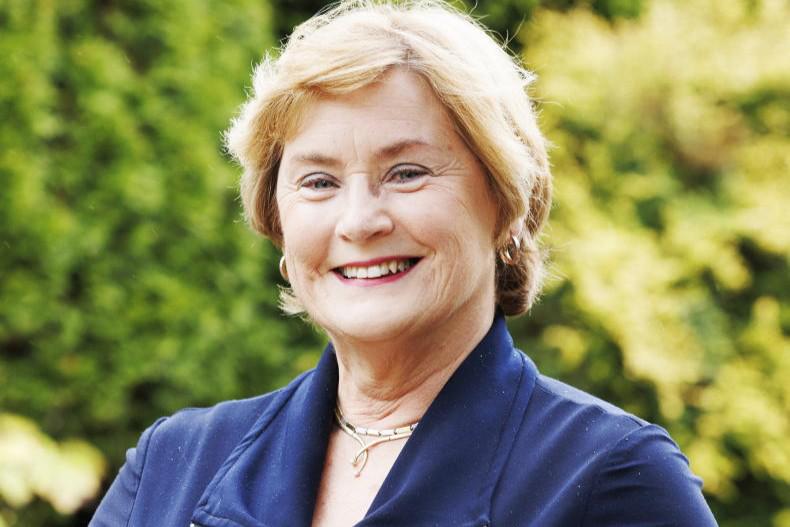


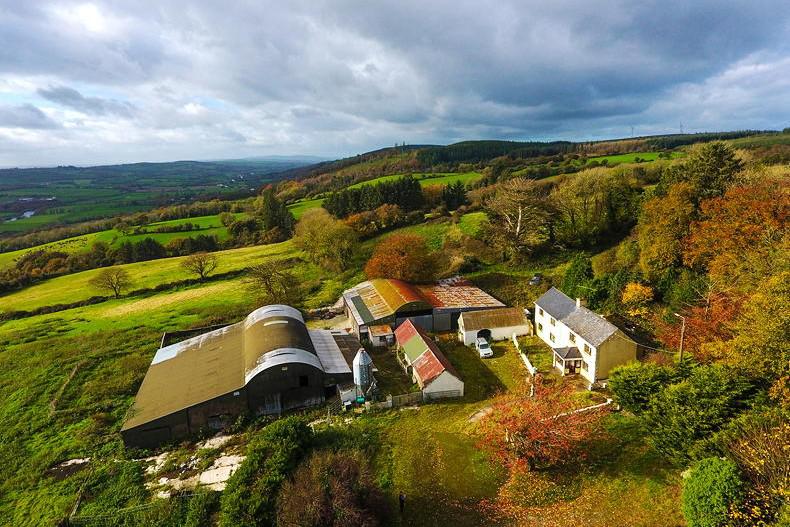
SHARING OPTIONS